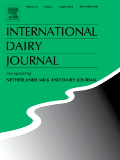
INTERNATIONAL DAIRY JOURNAL
Scope & Guideline
Elevating global knowledge in applied microbiology and food science.
Introduction
Aims and Scopes
- Dairy Microbiology and Safety:
Research focusing on the microbial communities in dairy products, their roles in fermentation, and the safety aspects concerning pathogens and spoilage organisms. - Dairy Processing Technologies:
Studies related to innovative processing techniques, including heat treatments, microfiltration, and other methods that enhance dairy product quality and safety. - Nutritional and Functional Properties of Dairy Products:
Investigations into the nutritional benefits, bioactive compounds, and health impacts of various dairy products, including functional and probiotic aspects. - Dairy Chemistry and Biochemistry:
Research on the chemical composition, structural properties, and biochemical transformations occurring in dairy products during processing and storage. - Sustainable Dairy Practices:
Studies aimed at improving sustainability in dairy farming, including animal welfare, environmental impacts, and valorization of dairy by-products.
Trending and Emerging
- Alternative and Plant-based Dairy Products:
With the rise of dietary changes and preferences, research on plant-based dairy alternatives and their production methods is rapidly increasing. - Microbial Metagenomics and Probiotic Research:
There is a growing interest in understanding the complex microbial ecosystems in dairy products through metagenomics, focusing on probiotics and their health benefits. - Dairy Product Functionalization:
Emerging studies are exploring the functionalization of dairy products with bioactive compounds, prebiotics, and fortification strategies to enhance health benefits. - Novel Dairy Preservation Techniques:
Innovative approaches such as high-pressure processing, pulsed electric fields, and other non-thermal methods are becoming prominent in research aimed at improving dairy product shelf life and safety. - Health Impacts of Dairy Consumption:
Research on the health implications of dairy consumption, including its effects on chronic diseases, gut health, and nutritional benefits, is gaining more attention.
Declining or Waning
- Traditional Fermentation Techniques:
Although still relevant, the focus on traditional fermentation methods has decreased as research shifts towards modern biotechnological approaches and innovations. - Conventional Dairy Processing Methods:
There is a noticeable decline in studies primarily centered on conventional dairy processing methods, as the field increasingly embraces advanced technologies. - Single-species Fermentation Studies:
Research focusing solely on single-species fermentations is waning, with a growing emphasis on mixed cultures and their synergistic effects in dairy fermentation.
Similar Journals

Applied Biological Research
Pioneering Research for Real-World ApplicationsApplied Biological Research is a dynamic journal issued by the CENTRE ADVANCEMENT APPLIED SCIENCES, specializing in the interdisciplinary fields of biochemistry, genetics, and molecular biology. With its ISSN 0972-0979 and E-ISSN 0974-4517, this journal serves as a critical platform for the dissemination of peer-reviewed research that addresses pressing challenges and innovations within biological sciences. Although currently it does not adopt an Open Access model, it is dedicated to fostering academic discourse through rigorous publication practices. The journal's impact is underscored by its Scopus rankings, which place it in the 4th and 2nd percentiles in respective categories, emphasizing its emerging influence in the scientific community. Covering research from 2020 to 2024, Applied Biological Research is positioned as an essential read for researchers, professionals, and students seeking to stay at the forefront of biological research and application. Based in the beautiful region of Jammu & Kashmir, India, this journal is committed to advancing applied sciences through innovative research and outreach.

Journal of Food Science and Technology-Ukraine
Empowering Food Scientists with Accessible KnowledgeJournal of Food Science and Technology-Ukraine, published by the Odesa National University of Technology, stands as a pivotal platform dedicated to the dissemination of high-quality research in the field of food science and technology. With its open access policy established in 2014, the journal fosters global knowledge sharing and accessibility, enabling researchers, professionals, and students to access critical findings and advancements in food technology without barriers. The journal's commitment to publishing innovative studies, reviews, and case analyses reinforces its role in addressing contemporary challenges in food safety, preservation, processing, and nutritional quality. With ISSN 2073-8684 and E-ISSN 2409-7004, it serves as a valuable resource for the academic community, supporting the advancement of food science knowledge and its practical applications.
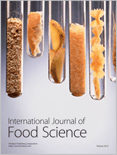
International Journal of Food Science
Empowering Research in Food Safety and NutritionThe International Journal of Food Science, published by HINDAWI LTD, stands as a crucial platform for advancing knowledge within the realm of food science. Established in 2013, this Open Access journal based in Egypt has garnered significant recognition, achieving an impressive Q2 classification in the 2023 Food Science category, which reflects its commitment to quality and impactful research. With a Scopus rank of #88 out of 389 in Agricultural and Biological Sciences and placing in the 77th percentile, this journal serves as an essential resource for researchers, professionals, and students dedicated to innovative developments and scientific exploration in food science. The journal not only provides unrestricted access to valuable research but also aims to foster collaboration and dissemination of knowledge on critical issues affecting food safety, nutrition, and technology. For those looking to keep abreast of the latest advancements, the International Journal of Food Science is certainly an indispensable addition to their academic pursuits.
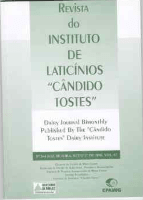
Journal of Candido Tostes Dairy Institute
Fostering Collaboration for Dairy ExcellenceJournal of Candido Tostes Dairy Institute, published by the prestigious INST LATICINIOS CANDIDO TOSTES, has established itself as a vital resource in the field of dairy science and technology. This Open Access journal, operating since 2008, provides an inclusive platform for researchers, professionals, and students to share groundbreaking findings and innovative practices related to dairy production, processing, and quality. Located in Brazil, this journal aims to advance knowledge and standards within the dairy industry, ensuring global access to high-quality, peer-reviewed research. The journal not only contributes to the scientific community but also supports practical advancements that benefit dairy producers and consumers globally. By fostering collaboration among scholars and practitioners, the Journal of Candido Tostes Dairy Institute plays a crucial role in shaping the future of dairy sciences. We encourage contributions that explore novel aspects of dairy research, thereby bridging theoretical insights with industry applications.

Applied Food Research
Innovating Insights in Food SystemsApplied Food Research, published by Elsevier, is an esteemed journal that plays a critical role in advancing the field of Food Science. With an ISSN of 2772-5022, the journal has established itself as a premier outlet for high-quality research, achieving a commendable Q1 ranking in the 2023 Food Science category and a 63rd percentile in Scopus rankings for Agricultural and Biological Sciences. Covering a diverse range of topics from food safety to innovative processing techniques, Applied Food Research seeks to publish pioneering studies that enhance our understanding of food systems and contribute to broader discussions on sustainability and nutrition. As it converges on its fourth year of publication, researchers, professionals, and students alike are encouraged to engage with its content through various open access options, ensuring widespread dissemination of knowledge in a field that is vital to global health and well-being. Operating out of Amsterdam, Netherlands, this journal is poised to be an indispensable resource for anyone dedicated to making significant contributions in the domain of food science.

Foods and Raw Materials
Transforming raw materials into impactful research.Foods and Raw Materials is a premier open access journal published by Kemerovo State University in the Russian Federation, dedicated to advancing knowledge in the field of Food Science. Since its foundation in 2013, the journal has established itself as a significant platform for researchers and professionals, featuring groundbreaking studies and innovative findings in both food science and veterinary disciplines. With an impressive impact factor reflected in its 2023 Scopus rankings—where it holds a Q3 categorization and is positioned in the 83rd percentile in Veterinary General, and the 75th percentile in Agricultural and Biological Sciences—the journal serves as an essential resource for academics and practitioners alike. As it continues to evolve and converge through 2024, Foods and Raw Materials aims to foster interdisciplinary collaboration and provide a comprehensive forum for the dissemination of significant research that shapes the future of food safety, sustainability, and technology.

Custos e Agronegocio On Line
Empowering researchers and practitioners with cutting-edge agricultural research.Custos e Agronegocio On Line is a distinguished open-access journal published by the Universidade Federal Rural de Pernambuco, specifically within its Departamento de Administração. Since its inception in 2005, this journal has been committed to disseminating high-quality research in the fields of accounting and agronomy, focusing on the intersections between economic practices and agricultural advancements. With a range of topics that cater to both scholarly and practical interests, the journal serves as a vital resource for researchers, professionals, and students navigating the complexities of agribusiness in Brazil and beyond. Despite its Q4 rankings in various categories, Custos e Agronegocio On Line provides a platform for innovative insights and discussions aimed at improving practices within its fields, reinforcing its importance in today’s dynamic agronomic and economic landscapes. As it converges the experience from 2009 to 2023, the journal is well-positioned to support ongoing dialogue and research in a rapidly evolving industry.
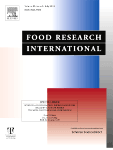
FOOD RESEARCH INTERNATIONAL
Driving Excellence in Food ResearchFOOD RESEARCH INTERNATIONAL is a premier academic journal published by ELSEVIER, specializing in the field of Food Science. With an impressive impact factor and ranked Q1 in the 2023 category quartiles, it stands at the forefront of research, positioned 17th out of 389 in the Scopus ranking for Agricultural and Biological Sciences, attaining a commendable 95th percentile. The journal publishes high-quality, peer-reviewed articles that cover a broad spectrum of topics, including food safety, quality control, nutrition, and biotechnology, making it an invaluable resource for academics, industry professionals, and students alike. As FOOD RESEARCH INTERNATIONAL seeks to enhance understanding and advance technologies related to food, it encourages innovative perspectives and interdisciplinary research. The journal, active from 1992 and continuing through 2024, is an essential platform for disseminating vital findings and fostering collaboration within the global food science community.

Emirates Journal of Food and Agriculture
Pioneering research in agronomy and food science.Emirates Journal of Food and Agriculture is a pivotal publication dedicated to the fields of agronomy, animal sciences, applied microbiology, and food science. Published by the prestigious United Arab Emirates University, this journal serves as a vital platform for disseminating high-quality research and innovative findings within these essential domains. With an ISSN of 2079-052X and an E-ISSN of 2079-0538, the journal has been operational since 1996 and continues to thrive as it converges towards 2024. Holding a notable position in the academic landscape, it is ranked in the Q3 quartile across various categories including Agronomy and Crop Science, Animal Science and Zoology, Applied Microbiology and Biotechnology, and Food Science. Additionally, its Scopus rankings reflect its contribution to advancing knowledge in Agricultural and Biological Sciences, showcasing its competitive standing. The open-access policy fosters wider dissemination of research, making it accessible to a diverse audience. By providing a forum for groundbreaking research and discussions, the Emirates Journal of Food and Agriculture is essential for researchers, professionals, and students eager to engage with contemporary issues and developments within these critical fields.
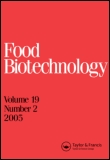
FOOD BIOTECHNOLOGY
Leading the Charge in Food Biotechnology ResearchFOOD BIOTECHNOLOGY is an essential journal for those engaged in the rapidly evolving fields of food science, biotechnology, and applied microbiology. Published by Taylor & Francis Inc., this journal has been a prominent platform since its inception in 1987, with a convergence of insights expected to continue until 2024. With an ISSN of 0890-5436 and an E-ISSN of 1532-4249, it holds significant academic weight, reflected in its 2023 rankings which place it in the Q3 category for both Applied Microbiology and Biotechnology and Biotechnology, alongside a stronger Q2 classification in Food Science. Although it currently does not operate as an open-access journal, its contributions to food biotechnology are invaluable for researchers, professionals, and students alike, providing a rigorous peer-reviewed outlet for innovative studies that advance the understanding of food processing, safety, and biotechnological applications. The journal’s relevance is further underscored by its Scopus rankings, which position it within the top tiers of its respective categories, making it a critical resource for the scientific community aiming to pioneer advancements in food biotechnology.